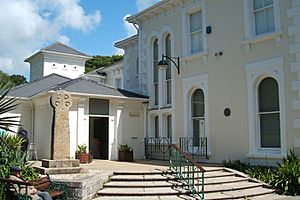Ricatus facts for kids
Ricatus was thought to be a king of Cornwall who lived around the 1000s. However, experts today are not sure if he really existed. The main reason people believed in him was because of an old stone cross.
Contents
The Mystery of the Penzance Cross
The only clue about King Ricatus comes from a special old stone called the Penzance Market Cross. This cross is very old, dating back to about 1050 AD. It now stands at Penlee House in Penzance, Cornwall, England.
For a long time, people thought an inscription on the cross said "REGIS RICATI CRUX". This means "Cross of King Ricatus". A scholar named R. A. Stewart Macalister wrote about this in 1949. He believed it proved Ricatus was a king.
What Did the Cross Really Say?
Later, another expert, Charles Thomas, looked closely at the cross. In 1994, he said the letters on the cross were very hard to read. He thought it was "impossible to follow" Macalister's reading.
Then, in 1998, Thomas studied the cross again. He decided the inscription actually said "RECGISI CRUX" or "RAEGISI CRUX". This means "the cross of Recgisi or Raegisi". These are old English names. Thomas believed this person was someone who gave the land for the cross. This new idea made many people doubt that Ricatus was a king.
Was He a King or a Local Leader?
If Ricatus did exist, he might have been a small local leader. This is because the cross is from a time when Cornwall was changing. It was less than 100 years before the Normans took over England. Some historians, like Philip Payton, suggest he might have been a symbol of Cornish independence.
Ricatus in Other Places
Even with the doubts, the name Ricatus has been used. In 1980, Mullion School in Cornwall named one of its school houses "Ricat".
There is also an old Cornish play from the 1500s called Beunans Meriasek. It talks about four Cornish kings. One of them is called Pygys. Some people think this might be a mistake for "Rygys", which is the Cornish way of saying Ricatus. This could mean the idea of a King Ricatus was around for a long time.


